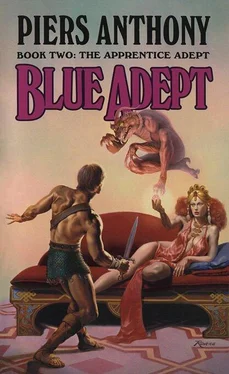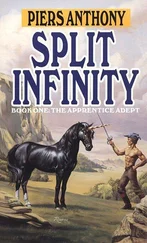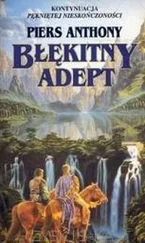Piers Anthony - Blue Adept
Здесь есть возможность читать онлайн «Piers Anthony - Blue Adept» весь текст электронной книги совершенно бесплатно (целиком полную версию без сокращений). В некоторых случаях можно слушать аудио, скачать через торрент в формате fb2 и присутствует краткое содержание. Год выпуска: 1981, ISBN: 1981, Издательство: Del Rey, Жанр: Старинная литература, на английском языке. Описание произведения, (предисловие) а так же отзывы посетителей доступны на портале библиотеки ЛибКат.
- Название:Blue Adept
- Автор:
- Издательство:Del Rey
- Жанр:
- Год:1981
- ISBN:9780808586548
- Рейтинг книги:3 / 5. Голосов: 1
-
Избранное:Добавить в избранное
- Отзывы:
-
Ваша оценка:
- 60
- 1
- 2
- 3
- 4
- 5
Blue Adept: краткое содержание, описание и аннотация
Предлагаем к чтению аннотацию, описание, краткое содержание или предисловие (зависит от того, что написал сам автор книги «Blue Adept»). Если вы не нашли необходимую информацию о книге — напишите в комментариях, мы постараемся отыскать её.
Blue Adept — читать онлайн бесплатно полную книгу (весь текст) целиком
Ниже представлен текст книги, разбитый по страницам. Система сохранения места последней прочитанной страницы, позволяет с удобством читать онлайн бесплатно книгу «Blue Adept», без необходимости каждый раз заново искать на чём Вы остановились. Поставьте закладку, и сможете в любой момент перейти на страницу, на которой закончили чтение.
Интервал:
Закладка:
“No Tourney Game is dull,” Stile said. “Sir.” Now he had the ball in good field position—but could he seize the opportunity to score? Stile doubted it. He simply did not have the ability to advance the ball consistently. So he would have to attempt to score from this range. That meant a forty-yard field goal. No, Stile doubted he had the power or accuracy for that. He would merely be throwing the ball away, unless he could get closer to the goal. His androids evidently couldn’t do that, and Stile himself was too small to carry it; the pass interception had shown that. This was one game where no advantage could be achieved from small size.
Or could it? These android brutes were accustomed to dealing with creatures their own size, and were slow to adjust. An agile, acrobatic man his size—why not show them some of the tricks he could do? Stile was small, but no weakling, and the androids were programmed not to hurt real people. He just might turn that into an advantage. In the huddle he had specific instructions for his center. “You will hike the ball to me—make sure you get it to me, for I am smaller than your regular quarterback—then charge forward straddle-legged. I clarify: hike the ball, then block forward and up, your feet spread wide. Do you understand?”
Dully, the android nodded. Stile hoped the creature would follow orders literally. These androids were the match of real people physically, but science had not developed their brains to work as well as the human kind. Androids cast in petite female forms were said to be quite popular with some men, who considered their lack of wit to be an asset. Specialized androids were excellent for other purposes such as sewer cleaning. It just happened that in this Game, Stile had to push to the intellectual limit of the type. In a real game of football, as played on Earth centuries ago, such an android would have been fully competent: this was not that situation.
The creature did as ordered. Stile took the ball, ducked down—and charged forward between the animal’s spread legs. The slow-witted opposing androids did not realize what had happened; they continued to charge forward, looking for a ball carrier to tackle. Stile scooted ahead five, ten, and finally fifteen yards before the Rifleman himself brought him down. “Beautiful play!” the Citizen said as they bounced together on the turf, their light armor absorbing most of the shock of impact. With a fifteen-point lead, he could afford to be generous. But the growing stadium audience also cheered.
Stile had his first down on the fifteen-yard line, but he knew better than to try the same stunt again. At any rate, he was now in field goal range, for his kicking ability—except that he still did not relish getting crushed in the blitz that would converge on the placekicker. Then he dredged from his memory an alternative: the dropkick. Instead of having the ball held in place by an-other player for the kick, the kicker simply dropped it to the ground and kicked it on the bounce. A dropkick, unlike a punt, was a scoring kick. Its disadvantage was that it was less reliable than a placekick, since the bounce could go wrong; its advantage was that it could be done on extremely short notice. Short enough, perhaps, to surprise the androids, and enable Stile to complete it before getting tackled and buried.
He decided to try it. He took the ball as quarterback, faded back a few yards, then dropped it for the kick. The ball bounded up, and the androids ceased their charge, realizing that this differed from a punt. Stile watched with gratification as the football arced between the goal posts. It was wobbly and skewed but within tolerance. The referee signaled the score: three points. “The drop kick!” The Rifleman exclaimed. “I haven’t seen one of those in years! Magnificent!” He seemed more pleased about it than Stile was.
But now it was Stile’s turn to kick off to the Rifleman. He decided to gamble again. “Do you know the onside kick?” he asked his teammates.
Blank stares were returned. Good—the animals had not been programmed for this nuance. Probably the other team’s androids would not know it either, so could reason-ably be expected to flub it. The Rifleman would know it—but Stile intended to kick the ball away from him. He tried it and it worked. Stile’s team had possession of the football at midfield. “Oh, marvelous!” the Rifleman exclaimed ecstatically.
Back in the huddle. “Number One will field the ball,” Stile told the animals, referring to the Rifleman’s shirt designation. “Charge him, box him in, but do not tackle him. I will tackle him.”
Uncomprehending, the androids agreed.
Stile punted on first down. This time he had the feel of it, and hung the ball up high, giving his players time to get down to it before it landed. The Rifleman, alert to this play, caught the ball himself, calling his own players in around him. Thus the two groups formed in a rough circle, Stile’s animals trying to get past the Rifleman’s animals without actually contacting the Rifleman. Perplexed by this seeming diffidence, the Citizen started to run with the ball. That was when Stile shot between two of his own players, took a tremendous leap, and tackled the Rifleman by the right arm where the football was tucked. He made no bruising body contact, for that would have brought a penalty call, but yanked hard on that arm. As the two twisted to the ground, the ball passed from the Citizen’s grasp to Stile’s. Stile was of course adept at wresting control of objects from others; he had specialized in this maneuver for other types of games. Once again, his team had possession of the ball.
“Lovely,” the Rifleman said, with slightly less enthusiasm than before.
The ball was now just inside the twenty-yard line. Stile drop-kicked another field goal. Now he had six points. And eleven minutes remaining in the game.
He knew he would not get away with another onside kick. The Rifleman would already have alerted his team to that. This time Stile would have to play it straight, and hope to stop the Citizen’s devastating drive. Stile kicked it deep, and it went satisfyingly far before being fielded by a Black android. Stile’s androids were alert to this routine situation, and they brought the carrier down on the twenty-yard line.
Now Stile had to stifle the passing attack. He decided to concentrate on rushing the passer and hoping for an interception. He himself would cover one of the Rifleman’s receivers, while double-covering the other with androids. This seemed to be effective. The Rifleman faded back for his pass, did not like the situation, but did not want to run or get tackled. So he overthrew the ball, voiding any chance for an interception. According to the quaint conventions for this sport, all parties knew exactly what he was doing, and it mandated a penalty for deliberate grounding, but none was called. Because if deliberate grounding of the ball was done with discretion, it was presumed to be a throwing error instead of what it obviously was. Presumably this sort of thing added luster to the game.
On the second down the Rifleman tried a pass to the double-covered receiver, but two androids were better than one and again it went incomplete. Good: one more such failure and he’d have to turn over the ball on a kick. Stile was at last managing to stifle the Citizen’s passing attack. On third down, the Rifleman rifled the ball directly to the receiver Stile was covering. He aimed it high, to be out of Stile’s reach, but reckoned without Stile’s acrobatic ability. Stile leaped high to intercept it—and was banged aside by the receiver, who had not realized what he was going to do. No android would have leaped like that. A referee’s flag went down.
The penalty was offensive pass interference. Stile’s team had the ball again. This time the Rifleman’s congratulation was definitely perfunctory.
Читать дальшеИнтервал:
Закладка:
Похожие книги на «Blue Adept»
Представляем Вашему вниманию похожие книги на «Blue Adept» списком для выбора. Мы отобрали схожую по названию и смыслу литературу в надежде предоставить читателям больше вариантов отыскать новые, интересные, ещё непрочитанные произведения.
Обсуждение, отзывы о книге «Blue Adept» и просто собственные мнения читателей. Оставьте ваши комментарии, напишите, что Вы думаете о произведении, его смысле или главных героях. Укажите что конкретно понравилось, а что нет, и почему Вы так считаете.











